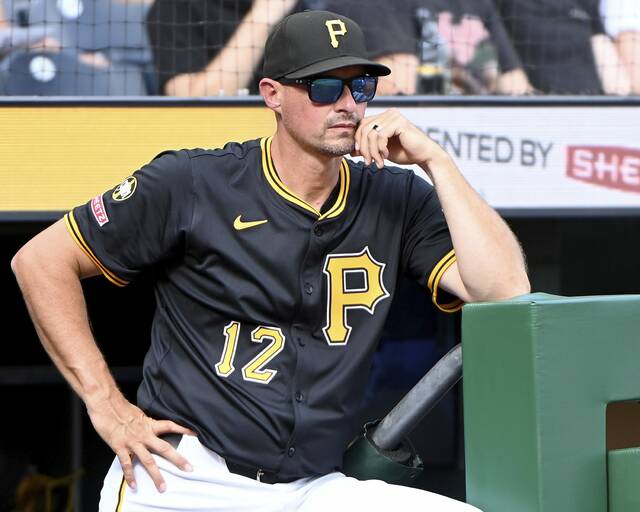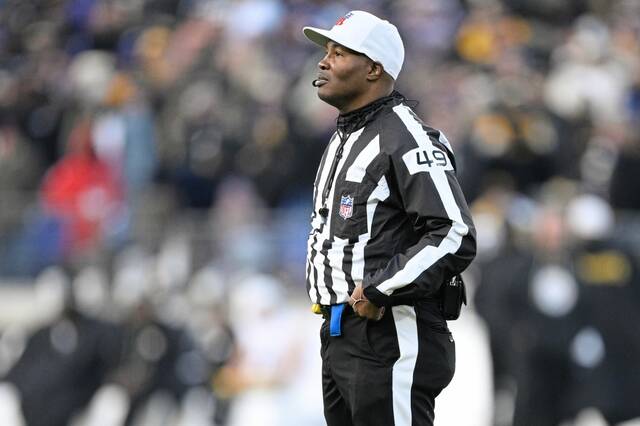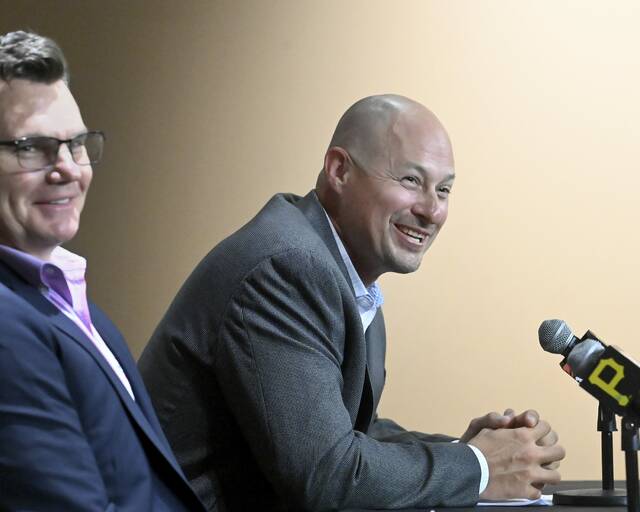After some serious soul searching, Chase De Jong decided he wasn’t ready to quit baseball. But he had nowhere to train, and no one to train with. That brought about a my-way-or-the-highway moment.
The Pittsburgh Pirates pitcher’s way hadn’t worked. De Jong had gone from second-round draft pick by the Toronto Blue Jays in 2012 to being traded three times, released once to playing independent baseball. At the outset of the pandemic shutdown, DeJong was at a crossroads in his career.
The Minnesota Twins had made De Jong aware of what he calls “the unique characteristics” of his four-seam fastball, which had low velocity in 2018 (89.2 mph) but a high spin rate (2,330) in 2019. The instruction was for De Jong to throw it up in the strike zone.
“They’re like, ‘If you do this well, you’re an everyday pitcher in the big leagues. If you don’t do this well … ,’ ” De Jong said, reminding himself that he already had been released. “So it was I had to get good at that, or it was time to get a 9-to-5.”
So DeJong chose the highway approach.
“I didn’t have a throwing partner, so I went to the side of the 405 freeway and started throwing weighted balls,” said De Jong, a Long Beach, Calif., native. “I actually started throwing a tennis ball, kind of like you do as a kid, against a chalked target, really just trying to utilize that backspin of a four-seam fastball, because you can actually visualize it better with a tennis ball.”
De Jong’s major league comeback is one of the best stories of spring training for the Pirates — and not just because they are his seventh team or that his father-in-law is two-time Masters champion and former world No. 1 golfer Bernhard Langer.
The 6-foot-4, 230-pound right-hander is battling for a spot on the pitching staff, with designs on making the starting rotation but also open to being a multi-inning reliever.
De Jong finished the 2019 season and went from the Sugar Land (Texas) Skeeters of the Atlantic League to being acquired by the Houston Astros last summer, where he started two games during the regular season and was added to their ALCS roster.
Even so, De Jong bet on himself once again and elected free agency. When the Pirates came calling in December, De Jong was interested because manager Derek Shelton had been his bench coach with the Twins and pitching coach Oscar Marin a minor league pitching coordinator with the Seattle Mariners in 2017-18.
“This is just a phenomenal opportunity,” De Jong said, “and I knew that I needed to show up here ready to win a job.”
De Jong is 1-0 with a 1.13 ERA and .222 batting-average against in three Grapefruit League games, including three scoreless innings in a start against the Blue Jays on March 12. After De Jong pitched three scoreless innings in relief of Mitch Keller in a 10-9 loss to the Tampa Bay Rays on Wednesday, Shelton cited the execution of De Jong’s fastball as the most noticeable difference.
“In Minnesota, it was sporadic, and I think he was learning how to use his stuff,” Shelton said. “That’s a credit to the kid. He’s had a tough road back to the big leagues, pitched in the big leagues last year with Houston and was in Skeeterland, and that’s grinding. He did that, and I think the fastball execution has considerably been better since the time I previously saw him.”
With no invitations to major league or minor league camps, De Jong returned to Sugar Land to play for manager Pete Incaviglia in the newly formed Constellation League. It was a humbling experience in what would become “an incredible year” for the former bonus baby.
“Really had to bear down when I was playing down there, and I had to figure it out,” De Jong said. “I wasn’t hurt. I was just a bad pitcher.”
A bad pitcher with a supportive family. The Langers are ultra-competitive, and De Jong’s wife, Christina, played golf at Florida Atlantic. Christina shot a 76 when she was seven months pregnant, and De Jong is a two-handicap, so their matches have a lot on the line. Winner picks dessert, and loser does dishes.
De Jong joked that after his father-in-law beat him in games of golf, hearts, ping pong and pool, he suggested a game of knockout basketball to use his height advantage to finally find a way to win.
“The guy’s just a mental machine,” De Jong said of Langer during an in-game interview with Robby Incmikoski on AT&T SportsNet. “Look what he’s done: He’s come back from the yips twice, won the Masters twice — with two different putting strokes — and he’s an unbelievable man of faith. He attributes that to his success, and I do the same. … The guy’s been at the peak. He was the first No. 1 golfer ever in the world, so it’s pretty cool to have that wealth of knowledge at my disposal.”
Yet De Jong comes from a family where faith and education are important. His father and brother are doctors, and his mother has a master’s degree. (That’s why Chase and Christina named their first-born son Clayton Bernhard De Jong, after their fathers). Instead of looking for an exit strategy, De Jong prayed for guidance on whether God’s plan was for him to continue his baseball career or find his life’s work.
“I’ve had that legitimate conversation with my family, like ‘Hey, is it time to move on? Do I need to go get a real job? Do I need to go do that? Do I need to transition into something else?’ ” De Jong said. “And we all prayed about it and decided no. We’re not done yet. Never looked at Plan B. This has always been Plan A and really beared down and went down there, made the adjustment and made myself relevant again.”
In Sugar Land — or Skeeterland, as Shelton called it — De Jong worked on his curveball command, as well as the conviction to throw it without worrying about walks. The results were eye-popping.
De Jong was 1-2 with a 3.18 ERA with a league-best 17 strikeouts per nine innings. In his final two starts for the Skeeters last July, De Jong struck out nine in four innings followed by 10 strikeouts in five innings.
Even better, the velocity on his fastball improved a few ticks on the radar gun. After averaging 89.2 mph in 2018, he now is sitting at 93. He called his agent and told him, “Hey, I throw hard now” and sent him the Trackman numbers. At his next outing, there were four MLB scouts in attendance. A few weeks later, he was back in the big leagues. Now, De Jong is trying to make himself relevant for the Pirates in any way possible.
“I just know that I’m here to be a starting pitcher or be stretched out and be able to cover multiple innings at a time, whether that’s as a starter, whether that’s out of the bullpen and throwing three innings twice a week,” De Jong said. “I told Oscar today, ‘I’m going to be your Swiss army knife. I’m going to be whatever you need me to be that day, that week, that series.’ I’m just here to be a pitcher. I’m here, and I’m ready to cover innings and help this team win ballgames.”








